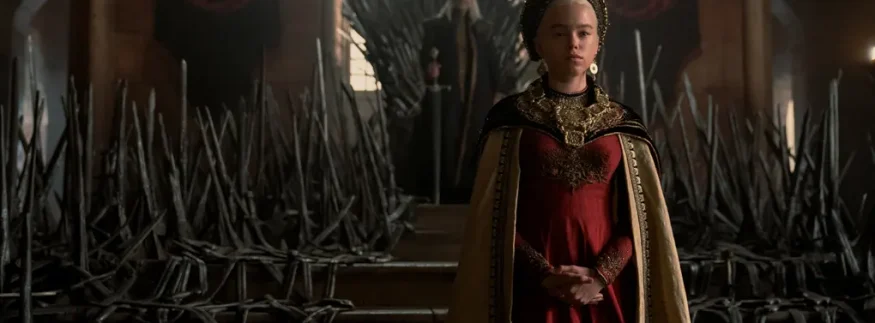House of the Dragon: A Shakespearean Tale of Power and Heritage
arts cairo egypt films Game of Thrones House of the Dragon Prequel review
Nada Medhat
Via TheGuardian
The highly anticipated Game of Thrones prequel premiered on HBO on August 21, to be met with such enthusiasm that the site crashed. Game of Thrones’ original fanbase – who understandably stomped away in anger after the final season – returned like the prodigal son with renewed hope. To say expectations are high then, would be an understatement. House of the Dragons isn’t just demanded to be a good show that lives up to the complex creation of G.R.R Martin, nor to return us to Game of Thrones’ prime and glory times, but to redeem the damage the final season left behind. Fairly a lot to ask, but does it meet all of those demands? Having watched the first episode, we have the answers!
Aware of its historical nature, the first episode starts with a Scheherazadian-like narration, Rhaenyra Targaryen telling the brief story of how her father inherited the Iron Throne, winning against his cousin, whose rightful claim to the throne didn’t help her in a patriarchal monarchy, subsequently named “the Queen that Never was”. In a theatrical scene that, like ancient theatre, the doom brewing within is set up, where, predicting the not-so-far future of Targaryen power turning on itself, Jaehaerys Targaryen names an heir in his lifetime. “Jaehaerys called the Great Council to prevent a war being fought over his succession,” Rhaenyra narrates, “for he knew the cold truth: the only thing that could tear down the House of the Dragon was itself.”
Indeed, the “tearing down” is the direct subject of House of the Dragon, a brutal civil war that is brilliantly set up in the first episode; titled The Heir of the Dragons, the first episode introduces Viserys Targaryen (empathetically performed by Paddy Considine) smothered in anxiety, dressed in illusional hope that his wife’s umpteenth pregnancy will result in a male heir to ensure the peaceful succession of the Seven Kingdoms. His only surviving child is dragon-rider, clever Rhaenyra (Milly Alcock) who’s painfully aware of her one fault in her father’s eyes, namely being born a woman (“I will never be a son”, says Rhaenyra in one of the episode’s most emotional scenes). Her father’s own direct male heir being his brother Daemon (Matt Smith), whose volatile and unpredictable nature isn’t the exact recipe for future peace and prosperity.
The tension is so high, with a collection of colourful characters, each less trustworthy than the other, that when the inevitable, tragic death of the king’s wife, Aemma Arryn (Sian Brooke) takes place in one of television’s most gruesome childbirth scenes, followed immediately by the death of the newborn son, and the council’s effective persuasion of the king against his brother, that when the heroine is finally acknowledged and named the heir. For once, Rhaenyra steps out of the shadow of a non-existent son, even those rooting for her can’t help feel the dread that metaphorically fills up the screen. Perhaps even more effectively than Games of Thrones ever did, House of the Dragon organically set up the true danger of the Iron Throne in one episode. The naming is no gleeful celebration.
The world, more limited than Game of Thrones’s sprawling of the literal Seven Kingdoms, offers a more grounded depiction of the Targaryen family. Dragons are no longer ancient, mythical creatures that their appearance to both audience and characters is supposed to inspire awe and disbelief. On the contrary, their existence is amusingly normalised that Rhaneyrs coming back from a dragon-ride is merely commented upon by her parents, “you stink of dragon”, as though she was doing no more than playing catch with the family’s dog. Despite the episode’s later discussion of the dragons and their place in the Targaryan’s claim to the throne, “Without the dragons, we’re just like everyone else,” reminisces Rhaenyers to her father, with his own remarks being that dragons are too great a power for any man to wield, foreshadowing the self-destruction and tragic fall of the dynasty.
The casting of House of the Dragon is brilliant. All actors fully embody the characters with all their complexities: Paddy Considine captures the fluid, easily manipulated nature of Viserys without making him comically weak, masterfully making him sympathetic in his easily most despicable scene; Matt Smith does no less in the role of the younger unruly brother, one of the most promising characters in the entire show, where he’s equally dark as he is light; the actress playing the younger versions of Rhaenyra Targaryen and Alicent Hightower organically showcase both the innocent without the naivety nature of their characters.
Essentially, House of the Dragon is a tragedy in its most literary definition, it’s a show that openly proclaims its nature of depicting the downfall of a family that is “closer to the gods than to men.” The anticipation of the audience watching the show isn’t of one only dying to know what will happen in the end. It’s the world’s history, it already happened. One can say that one of Game of Thrones’ downfalls was its writers’ obsession with shocking the audience, there is no chance of this happening here, offering a promise of writing that’s faithful to itself beyond the mere desire to create the unexpected, no matter how little sense it makes.
recommended
 Restaurants
Restaurants
Cairo's Ramen Revival: 5 Must-Try Bowls Around the City
 Cafés
Cafés



